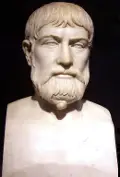Pindar: Lyric Poet of Ancient Greece
One of the most famous writers from Ancient Greek times was the lyric poet Pindar. He lived in the 6th and 5th Centuries B.C. 
He was particularly well-known for his epinicia, or victory odes, poems written for winners in events at the Panhellenic Games. Four books containing 45 of these survive; they are presented in four books, one for each of the Panhellenic Games (Isthmian, Nemean, Olympian, and Pythian). An epinicion typically had three stanzas and featured rich allusions to mythological figures, accentuating the accomplishments of the humans who were the focus of the odes. He wrote many kinds of poetry, including dithyrambs (a song-and-dance combination performed in honor of Dionysus), hymns, laments, paeans (expressing triumph or thanksgiving), and processionals. Most of what he wrote survives only in fragments. Pindar was born in about 522 B.C. in the village of Cynoscephalae, near Thebes. Of his family life, only names are known: His parents were Diaphantus and Cleodice, his wife was Megacleia, his daughters were Eumetis and Protomache, and his son was Diaphantus. He lived most of his life in Thebes proper. As his fame grew, his house became one of the city's landmarks; it was one of the few preserved when the Macedonian Army in 336 B.C. sacked Thebes for resisting the overlordship of Alexander the Great. (Alexander was grateful to Pindar for the victory odes written in honor of the first King Alexander of Macedon.) He traveled extensively throughout the Greek world, visiting the courts of kings and tyrants, particularly Hieron of Syracuse. He visited the island of Aegina often and wrote one-quarter of his odes in honor of the people there. He also penned poems honoring various city-states, most notably Athens and Thebes. Pindar is thought to have been in Argos when he died, age 80.
|
|
Social Studies for Kids
copyright 2002–2026
David White




